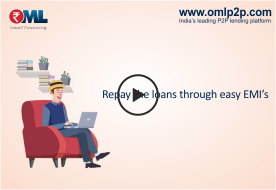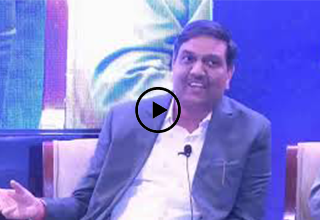How to start building wealth at the earliest?
Jun 18,2020 Investing, Savings, Peer to Peer Lending

It's said that the second best time to start anything is today. The best time to start was yesterday. If you didn't, make today the day.
You're never too old to start building wealth, but if you start when you're young, you have far greater potential to accumulate a fortune and more time to let that fortune compound itself as you grow older. The earlier you start investing, the more money you will accumulate over time. Everyone can find money to invest if they analyse and change their spending habits.
Investing allows you to take advantage of compounding of interest. Its said that the eighth wonder of world is compounding of interest. The strength of compounding can been seen from the fact that if you start investing a small sum of Rs. 1,000 per month from the age of 10 years, at the time of your retirement (after 50 years) you would have saved only (Rs. 6,00,000/-). Assuming you were able to invest the same @15% p.a. compounding rate of interest, you get a sum total of Rs. 14,08,42,944/- . Yes you read it right, you get 2,318 times of your money invested. Unbelievable but TRUE. This passively grows your wealth over time to provide your protection for your financial safety and security.
Steps to Start Building Wealth
- Set savings goals
If you are focused on building wealth, it helps to have a clear goal in mind. Decide whether you want:- Financial Independence
- Retirement Savings
- Money to Start a Business
- Extra Income
- Emergency Fund
- Time to reach that goal
- How much you need to save
- How risky your investments can be
- Type of investments to make
- Add to your savings frequently
When you are making money, it is easy to spend most if not all of it. The reason one is not saving enough is that your wants and needs always surpass what you have budgeted. Developing a habit of constant saving is important. It is important to have a sizable amount saved up for the future. It is important to have an emergency fund because you can face sudden expenses and avoid debt. The frequency of your contributions (e.g. weekly, monthly, or yearly) has an important impact on your long-term success. - Create a budget
Going over budget is a behavior trend that is hard to stop when you get comfortable to it. You might want to;- Track the way you spend. If you find that doing this on your own is hard, you can use online apps. Or take the help of the financial consultants. Make sure that you can categorize your expenditures and see where your money is going.
- Cut down on the spending. Separate your wants from your needs. Find creative ways to cut out the unnecessary spending. This will leave you with much more to save and build an emergency fund for about six months worth of living expenses.
- Before you buy anything, ask yourself if you need it. Most times you will find out that you do not. This will help you curb impulsive buying.
- Learn about investing
If you did not grow up learning about investing and your parents did not invest much, it can be intimidating to start. There are so many different options to choose from, including company stocks, government bonds, mutual funds and alternative investment options like P2P lending. It can be difficult to predict growth at times. As the saying goes, when there is no risk, there is no reward. As you start investing, other things to consider include:- Diversification: Having a variety of investments will offer you more protection during market fluctuations.
- Tax Advantages: Certain investments types may be exempt from state/ local, or central government taxes. Investments in mutual funds, PPF, etc often offer tax advantages as well.
- Liquidity: Some investments, such as company stocks or bonds, can be sold at any time, while accounts like fixed deposit or recurring deposits may restrict when you can cash out. Be sure that you can access money for an emergency without paying penalties / withdrawal fees.
- Time Horizon: Your time horizon for requirement of the savings also make you to decide the investment instruments, short term fund are not advised to be invested in volatile instruments like shares and securities.
- Your need of Monthly Income or Lumsum Income: If you need a monthly income scheme or a consolidated fund for a particular option, its good to go for a safe and secure options having least volatility like Bank deposits, Liquid Mutual Funds or Peer to Peer (P2P) lending platforms.
- Use compounding when you invest
When you move money from savings into an investment vehicle, take advantage of compounding.- Compounding will make your investments grow faster, like a snowball effect. The longer it rolls, the faster it grows. Compounding works faster if you invest more frequently.
- When you compound your investments, you are earning "interest on interest". Over time, you earn interest on both your original investment and on the prior interest you earned.
- Make Steady Progress
- Take steps each month to make progress. Instead of saving a big amount some months, then pulling money out of savings other months, set a smaller amount for each month so you are always saving. This allows your money to continuously earn interest and grow.
- Set up recurring transfers / ECS / SIP from your bank to your investment. This allows you to automate your contributions, which is the easiest way to make sure you continue to invest.
If you aim to put 10% of your income straight into investments, especially if you are allocating other funds to retirement savings, you will begin to build wealth and create a more stable financial future for yourself.
The author is Digital Marketing head of www.omlp2p.com. The article written by him is in his personal capacity and educational in nature. All the views are his personal views. www.omlp2p.com, the peer to peer lending platform has placed (promoted) the articles to benefit the general borrowers and lenders. You may write to author for your quarries at customer.support@omlp2p.com referring the article name and your details.
www.omlp2p.com is one of the India's RBI (Reserve Bank of India) registered NBFC-P2P, providing technology enabled e-commerce platform to it's Lenders and Borrowers to avail their loan at a highly competitive Rate of Interest, in a hassle free manner without much of documents; at the same time it provides its Lenders Higher return on their capital by providing opportunities to lend to good quality, well assessed borrowers.









Comments
Post Comment